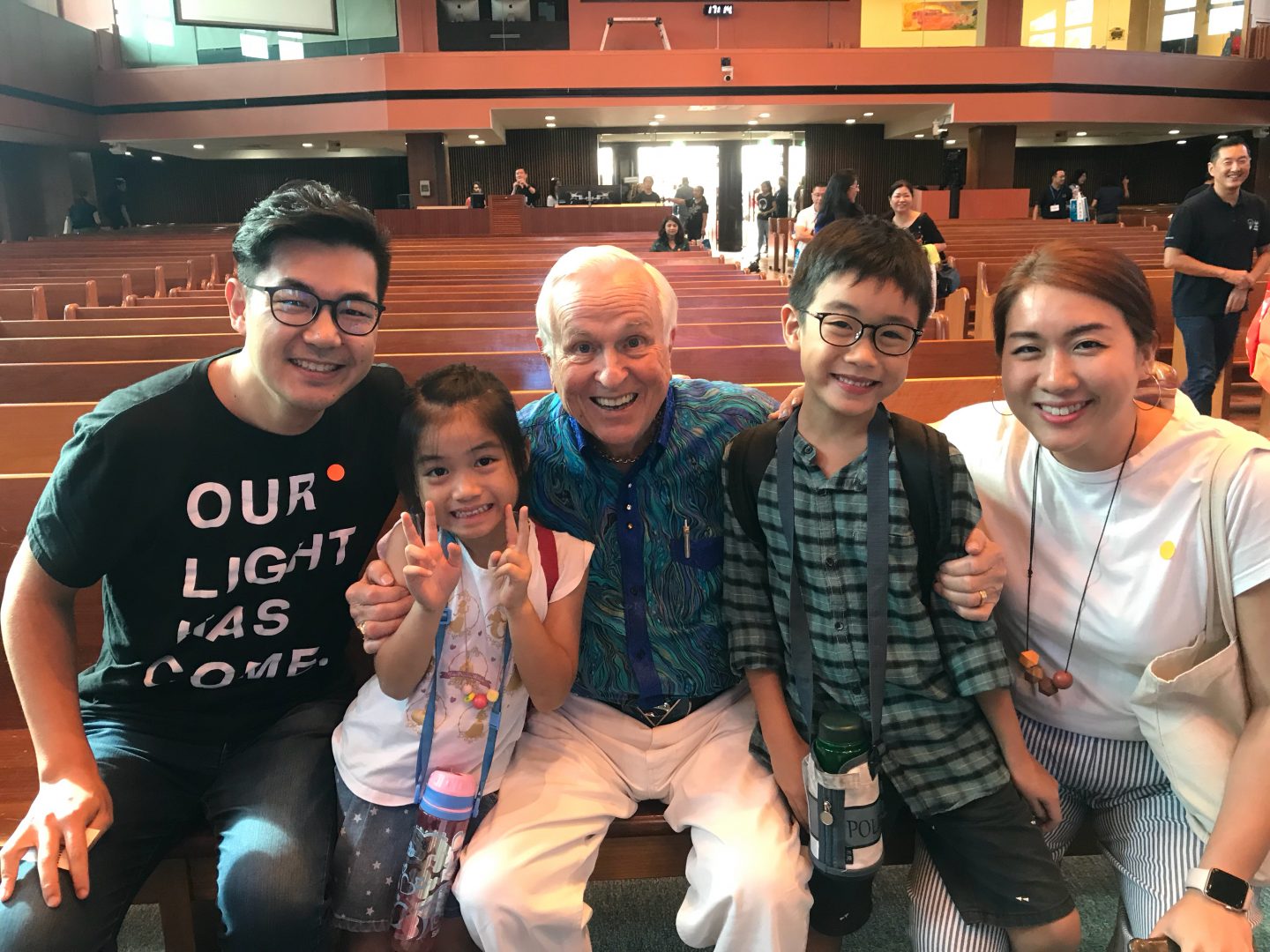
"We need to remember that we can’t just be physically there with our kids – we need to be present mentally and emotionally too!" says Dr Josh McDowell (centre), goofing around with Phoebe, 6, and Nathan, 8, and their parents, Elvin and Esther Foong from The Treasure Box SG. All photos courtesy of Elvin and Esther Foong.
The packed hall broke into loud applause as the silver-haired gentleman made his way up the stairs and onto the stage.
Settling down in his chair, Dr Josh McDowell surveyed the crowd. Noticing some older folks in the pews, he began: “Grandparents need to learn how to shut up. We’re not supposed to parent our grandkids.
“Rules without relationship lead to rebellion. Truth without relationship leads to rejection. And discipline without relationship leads to bitterness.”
“All we can do is hope that we’ve parented our kids well enough, that they’ll do a good job of parenting their own children.”
And right off the bat, we knew that this was going to be no ordinary parenting workshop.
“The best thing you can do for your child is to build a loving, intimate relationship with them.” Heads nod all across the room.
“Rules without relationship lead to rebellion. Truth without relationship leads to rejection. And discipline without relationship leads to bitterness, resentment and anger. Without the context of that loving relationship, rules and discipline will always backfire on us.”
He quickly clarifies that there is no such thing as a perfect-parent guarantee – we can do everything right, but our children can still stray.
“But,” he adds, “the chances of that happening are much lower when our children know that we love them.”
Building unbreakable parent-child relationships
For the rest of the session, he breaks down the seven key principles of Biblical parenting (he self-deprecatingly jokes that he’s no Chuck Swindoll – the fact that they were all words starting with the letter ‘A’ was a surprise to him too).
1. Affirmation
To affirm a child is to give him or her a sense of authenticity.
When we learn to affirm our children, we authenticate their emotions and their perspective of the world.
Quoting Romans 12:15, he shared an illustration of what it truly meant to “rejoice with those who rejoice, and weep with those who weep”: A dad sees his son fall down, and instead of telling him to man up and stop crying, goes over and says, “I’m so sorry you fell. That looked like it must have really hurt.”
The boy, who had previously been wailing in pain, looks at his dad with bright eyes and says: “Thanks, daddy! I feel much better already!”
When we learn to affirm our children, we authenticate their emotions and their perspective of the world.
This encourages them to continue expressing their true feelings, instead of hiding them.

“When we learn to accept our children just as they are, our kids develop a sense of security,” reminds Dr Josh McDowell.
2. Acceptance
Recognising that our children are created in the image of God, with infinite value, dignity and worth, compels us to accept them just as Christ accepts us (Romans 15:7).
When we learn to accept our children just as they are, our kids develop a sense of security – this builds a deep trust in the parent-child relationship, and the children know that they can never do anything that could cause their parents to reject them.
3. Appreciation
Everyone likes to be appreciated. When we receive appreciation, it gives us the feeling or thought that we’ve done or said something worthwhile.
It gives us a sense of significance.
When we intentionally look for the good in our children and thank them … they are more likely to repeat that good behaviour.
When Jesus was baptised, God Himself opened up the heavens and declared His pleasure with His Son.
When we consider that this was before Jesus began His public ministry, this act of showing appreciation is even more remarkable.
“Don’t just catch your kids doing wrong things and discipline them,” Josh chastises us earnestly. “Instead, keep a lookout for the good things that they do and express your appreciation to them!”
He cites the example of a father who stood quietly in a corner for seven minutes watching his kids interact with each other, with the intention of only noticing the good things that they did.
Within that seven minutes, that dad found more than 20 things he could appreciate his children for.
When we begin to intentionally look out for the good in our children and thank them for it, we create a virtuous cycle where they are more likely to repeat that good behaviour!
4. Availability
Kids spell “love” as T-I-M-E.
If we tell our kids we love them but never spend time with them, they’ll gradually understand that our declarations of love are empty and that they are actually unimportant to us.
Kids spell “love” as T-I-M-E.
If even Jesus made Himself available to children despite His disciples’ best attempts to keep them away (Matthew 19:13-14) and despite his busy schedule, shouldn’t we do the same for our children?
In this era of smartphones and perpetual distractions, it takes much more from us to truly be present with our kids.
We need to remember that we can’t just be physically there – we need to be present mentally and emotionally too!
5. Affection
“I’ve discovered that men generally don’t take notes,” Josh remarks wryly at this point in the seminar. “They think that they have a photographic memory, but what they don’t realise is that they don’t have any film!”
The joke works because most of us are above 30 and remember what analog cameras are.
He has a serious point to make, though. He’s asking dads to write this particular principle down because, in general, dads have a harder time showing affection to their kids.
When we express affection to our kids through loving words and appropriate touch, our children learn to believe that they are lovable and worth loving. This builds their self-esteem and sense of value.
6. Approach
McDowell tells the story of how one of his sons really got into cars at one particular phase of his life.
“I wrote to all the major car showrooms on Beverly Hills – Porsche, Ferrari, Lamborghini,” he recalls. “I told them honestly – I’m just a desperate dad trying to make his son happy – and I asked if they would be willing to take him out for a test drive. And then I gave them only one space to tick: YES.
“All of them came back and said ‘yes’. In one afternoon, my son sat in nearly $4 million worth of cars for free, and had the time of his life.”
McDowell’s son, Sean, who is now grown and a marriage trainer and speaker, still talks fondly about that episode.
His point: When we take time to find out what our kids like and enjoy – when we approach their world instead of insisting that they only be allowed to exist in ours – we build a sense of connection. And this connection lasts; it will tide us through even the most difficult situations we may experience with our kids.
7. Accountability
Finally, when we provide reasonable rules and boundaries, and hold our kids accountable for them in the context of a loving relationship, it builds a sense of responsibility in our children.
Children grow best when we give them healthy boundaries to show our love and concern for their well-being.
They no longer see obedience as a chore, but as a response to the love they have received.
McDowell’s daughter went to a school dance, and her friend asked if there was a particular time she had to get home.
“I’ve got to be home by 10:30,” Josh’s daughter replied. Incredibly, her friend responded: “I wish your dad was my dad. My parents don’t even care what time I get home.”
Children grow best when they are given healthy boundaries, and when they understand that those boundaries are not there to keep them from enjoying life, but to show our love and concern for their well-being.
Walking the talk
At the close of the session, our family made our way to the front. We wanted to thank Josh for sharing his incredible insight, and present him with a copy of our book, Why Is Good Friday Good.
After waiting patiently in line, our children, Nathan and Phoebe, stepped forward shyly and gave him the book.
“I know how important it is for kids to have a father.”
In that moment, I realised that this was a man who practised what he had just preached.
With my wife and me, he was cordial, polite. But with our kids – it was like he came alive.
He couldn’t stop grinning, talking to them and giving them high-fives. He affirmed them, accepted them, appreciated them, made himself 100% available to them for those few minutes, spoke affectionately to them (he called Phoebe “the cutest little thing I’ve seen the entire trip”, which made me slightly jealous), and somehow found a way to approach their world.
And finally, he reminded them to keep on loving God and obeying their parents – accountability.
Near the end of the seminar, he had said matter-of-factly: “If there ever was a dad who worked the hardest at being a great dad, it would be me. It doesn’t mean that I’m great or perfect, it just means that I know how important it is for kids to have a father.”
Watching him interact with my kids, I have no doubt that he meant what he said.
My hope and prayer is that one day I, too, can tell other parents that I’ve spared no expense and no effort in making myself the greatest dad I could ever be to my kids.
Dr Josh McDowell was speaking on “7 practical principles essential for developing a loving relationship with your child” at the invitation of Cru Singapore. Find more events, testimonies, ministry training resources by Cru Singapore here.
We are an independent, non-profit organisation that relies on the generosity of our readers, such as yourself, to continue serving the kingdom. Every dollar donated goes directly back into our editorial coverage.
Would you consider partnering with us in our kingdom work by supporting us financially, either as a one-off donation, or a recurring pledge?
Support Salt&Light



